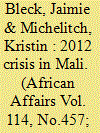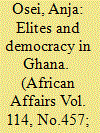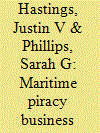|
|
|
Sort Order |
|
|
|
Items / Page
|
|
|
|
|
|
|
| Srl | Item |
| 1 |
ID:
141480


|
|
|
|
|
| Summary/Abstract |
In 2012 Mali faced a crisis disrupting nearly twenty years of democratization – a coup and rebel insurgency. This article investigates policy priorities amongst rural Malians living on the border of state and rebel-controlled territory during the crisis. While academic and policy-making communities have focused largely on Mali's recent and sudden regime and territorial breakdown, the villagers defined the crisis in terms of their unmet needs for public services and infrastructure amidst high food and water insecurity. Concern for the sudden ‘juridical state’ breakdown – the collapse of the democratic regime – was trumped by the focus on long-term ‘empirical state’ breakdown. Using recent Afrobarometer data on diverse dimensions of empirical statehood, we show that the problem of rural neglect emphasized by seminal scholars is persistent not only across Mali, but also across many African countries. The tendency of academics and policy makers to focus on the immediate or more volatile political problems of the coup and rebel insurgency facing the Malian state, while important, risks understating and underestimating the power of slow-moving crises of daily life that are more important to rural citizens.
|
|
|
|
|
|
|
|
|
|
|
|
|
|
|
|
| 2 |
ID:
141479


|
|
|
|
|
| Summary/Abstract |
In contrast to similar organizations in its neighbouring countries, Niger's domestic Salafi associations have remained peaceful and apolitical. Drawing on historical institutionalist scholarship and on recent conceptualizations of the state as a religious actor, this article examines how the Nigerien state has tried to regulate religious practices since Seyni Kountché's military coup in 1974. It argues that the institutional regulation of religious practices is one important variable that accounts for Niger's deviant trajectory. During Niger's autocratic period (1974–91), the government established the Association islamique du Niger (AIN) as the sole legal authority regulating access to Niger's Friday prayer mosques. Committed to peaceful and apolitical interpretations of the Koran, the AIN confined access to Niger's religious sphere to local clerics and Sufi brotherhoods. After the breakdown of autocratic rule in 1991, the AIN served as a religious advisory body. Salafi associations could assemble freely but had to abide by certain criteria. Confronted with the prospect of Islamic violence in 2000, the Nigerien state intervened in Niger's religious sphere in several ways. Among other initiatives, the government began to resurrect a more rigorous system of religious supervision in order to monitor religious practices on an ongoing basis.
|
|
|
|
|
|
|
|
|
|
|
|
|
|
|
|
| 3 |
ID:
141476


|
|
|
|
|
| Summary/Abstract |
There is increasing international concern about the growth of organized crime in Africa. Important criminal organizations and professional criminals are present in Africa, but we argue that the term “organized crime” is not a very useful description of their activity, since what we are actually witnessing is a reformulation of politics and crime into networks that transcend the state/non-state boundary in ways that are hardly subsumed in standard concepts of organized crime. Similar processes are taking place in various parts of the world, and thus African countries are not exceptional in this regard. The process, however, does take particular forms in Africa that arise out of the histories of individual countries. The article describes the evolution in countries as diverse as Libya, Guinea-Bissau, and Zimbabwe of a market for protection, as business people – legitimate and otherwise – seek protection for their activities and their personnel. This market for protection is created by making private arrangements, often with state officials working in private capacities. The implications are profound: they could amount to a new mode of governance connecting Africa to international markets and institutions in which the distinctions between licit and illicit economic activity become difficult to detect.
|
|
|
|
|
|
|
|
|
|
|
|
|
|
|
|
| 4 |
ID:
141477


|
|
|
|
|
| Summary/Abstract |
This article presents new theoretical and empirical insights into democratization in Africa, using the typology developed by John Higley and Michael Burton to understand elite interaction in Ghana. Social network analysis (SNA) is used to test the main proposition of the Higley/Burton theory, namely that a ‘liberal democracy is impossible without a consensually united elite’. Empirical evidence is provided from a unique data set that maps the interaction patterns between Members of Parliament elected to the Ghanaian legislature in 2012. The article shows that MPs in Ghana form a dense and strongly interconnected network bridging ethnic and party cleavages, and that MPs from different parties have developed a measure of trust in one another. These findings not only support Higley and Burton's claim that elite integration is conducive to stable democracy, but also point to new directions in African Studies by demonstrating the capacity of actor-centric approaches to explain processes of democratization in countries that lack the classic structural preconditions for consolidation.
|
|
|
|
|
|
|
|
|
|
|
|
|
|
|
|
| 5 |
ID:
141478


|
|
|
|
|
| Summary/Abstract |
The two regions with the greatest incidence of maritime piracy in Africa, the Horn of Africa and the Gulf of Guinea, are also known for the low quality of the institutions underlying their political economies. This article investigates how institutions in these areas shape and constrain the sophisticated maritime piracy syndicates and their behaviour. Engaging with the literature on state failure and maritime piracy, we argue that norms and institutions constrain even criminal organizations like piracy groups, which often mimic and are embedded in the licit economy. In the Horn of Africa, pirates take structural and ideational cues from the licit economy and are constrained by the informal regulations that govern clan groups, rent-based economic activities, and collective security arrangements in Somalia. In West Africa, sophisticated piracy both preys upon and arises from the formal economy, specifically the international oil industry. As a result, piracy networks often mirror and draw from both the formal institutions in Nigeria used to regulate and protect oil production, and those engaged in oil production, processing, distribution, and transportation.
|
|
|
|
|
|
|
|
|
|
|
|
|
|
|
|
|
|
|
|
|